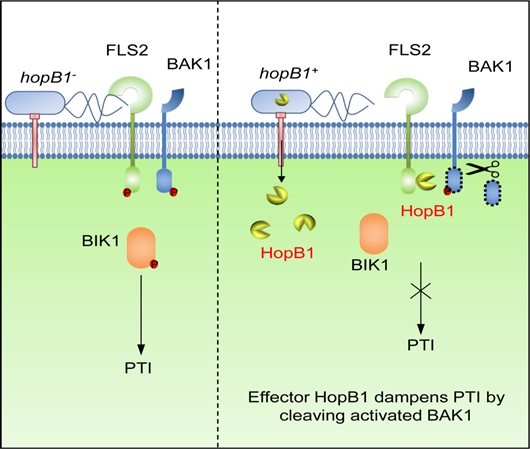A common feature of pathogenic microorganisms is their ability to deliver a variety of proteins termed effectors to perturb host cellular processes to aid in infection and/or colonization. Plants attacked by pathogen are known to possess a surveillance system to monitor activities of these effectors and activate defenses. How pathogen effectors assist pathogen infection while avoiding host recognition is a major dilemma in plant pathology.
The team led by Prof. ZHOU Jian-Min’s lab at the Institute of Genetics and Developmental Biology, Chinese Academy of Sciences, revealed how a bacterial effector attacks host cell while goes undetected.
Pseudomonas syringae, a bacterial pathogen that causes devastating diseases on kiwi and many other important crops, secretes a novel protease called HopB1 to destroy BAK1, a key plant protein required for sensing a variety of pathogens. Perturbation of BAK1 is known to trigger the plant surveillance system and elevates defenses. Surprisingly, HopB1 goes undetected during infection. Close examination of the biochemical mode of action showed that HopB1 does not cleave normal BAK1. Instead, it only attacks a phosphorylated BAK1, the activated form, so that it is unable to send the warning signal to other cellular compartments. This highly selective action minimized perturbation to the host, allowing evasion of the host surveillance system.
This study entitled “Activation-Dependent Destruction of a Co-receptor by a
Pseudomonas syringae Effector Dampens Plant Immunity” has been published online in
Cell Host Microbe (
http://dx.doi.org/10.1016/j.chom.2016.09.007).
This work was supported by Chinese Natural Science Foundation, the Chinese Ministry of Science and Technology grant, the Strategic Priority Research Program of the Chinese Academy of Sciences, and the Chinese Academy of Sciences international cooperation key project grant.

The Arabidopsis BAK1 protein is a co-receptor required for the detection of pathogen molecules and subsequent immune activation, leading to increased disease resistance; the Pseudomonas effector HopB1 is a protease that specifically degrades immune-activated BAK1, thus conferring increased virulence without overly perturbing the host plant. (Image by IGDB)
Contact:
Dr. ZHOU Jian-Min
 The Arabidopsis BAK1 protein is a co-receptor required for the detection of pathogen molecules and subsequent immune activation, leading to increased disease resistance; the Pseudomonas effector HopB1 is a protease that specifically degrades immune-activated BAK1, thus conferring increased virulence without overly perturbing the host plant. (Image by IGDB)Contact:Dr. ZHOU Jian-MinEmail: jmzhou@genetics.ac.cn
The Arabidopsis BAK1 protein is a co-receptor required for the detection of pathogen molecules and subsequent immune activation, leading to increased disease resistance; the Pseudomonas effector HopB1 is a protease that specifically degrades immune-activated BAK1, thus conferring increased virulence without overly perturbing the host plant. (Image by IGDB)Contact:Dr. ZHOU Jian-MinEmail: jmzhou@genetics.ac.cn CAS
CAS
 中文
中文




.png)
